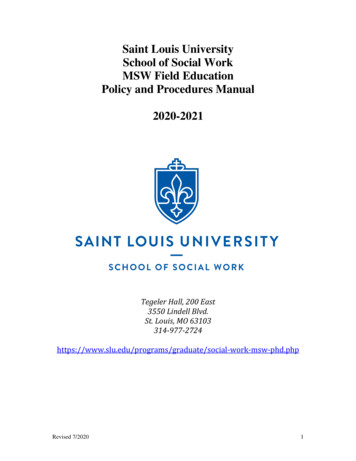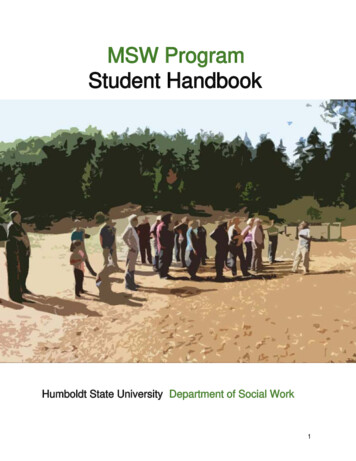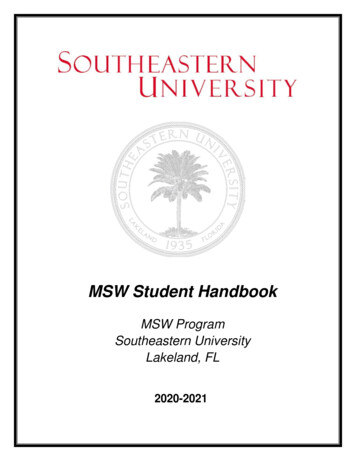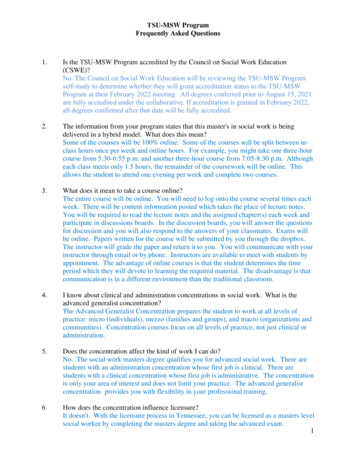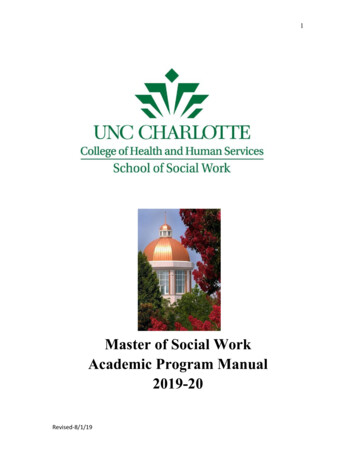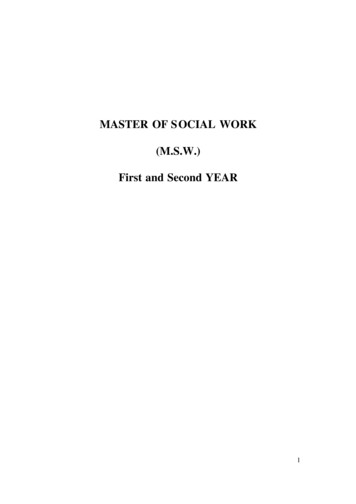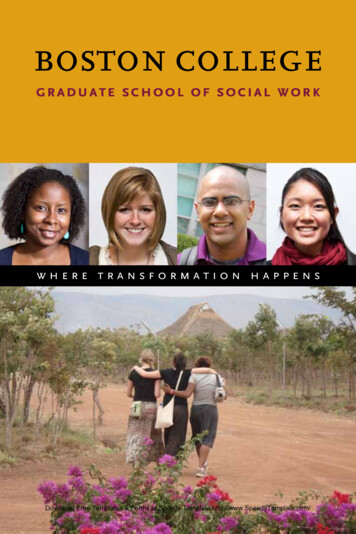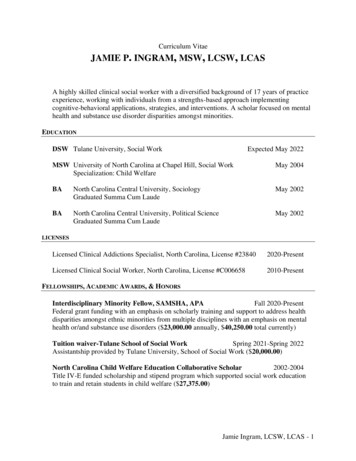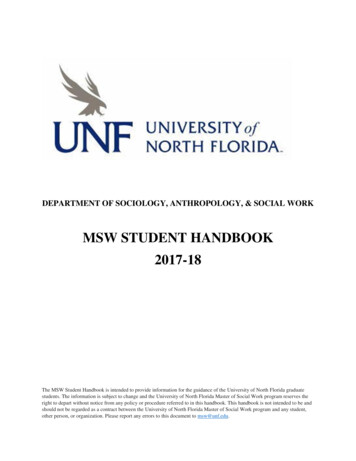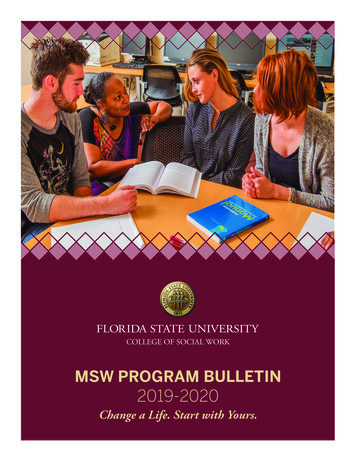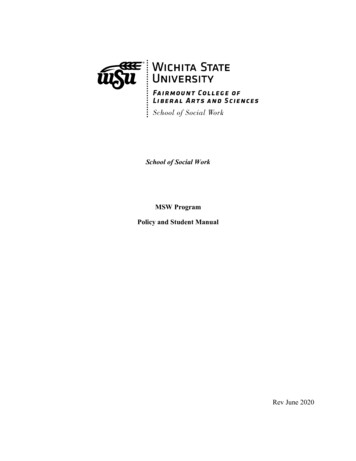
Transcription
School of Social WorkMSW ProgramPolicy and Student ManualRev June 2020
The School of Social Work reserves the right to make changes to this manual.Updated manuals will be posted on the School of Social Work website at www.wichita.edu/socialwork.
Table of ContentsWelcome to the School of Social Work at Wichita State University . 1Practice Areas . 1Accreditation . 1Social Work at Wichita State University . 2University, College and School . 2The Liberal Arts Perspective and Its Relationship to Social Work . 3The Liberal Arts Requirement . 3Admission to the MSW Program . 3Criteria for Admission to the MSW Program . 3The Senior Rule . 4Enrollment, Class Size, 700 Level Courses and Termination of Enrollment . 4Deferred Admissions—One Year Limitation . 4Nondegree Admission . 5Regular and Advanced Standing Programs . 5Full- and Part-Time, Regular and Advanced Standing, Sequencing of Courses . 5MSW Elective Course Requirements . 6Transfer of Academic Credit at Admission . 6Transfer of Elective Credit. 7Life and Work Experience . 9Academic and Professional Advising . 9The Graduate Catalog . 9Student Responsibilities . 9Student Rights . 10Governance . 10Notice of Nondiscrimination. 11Progression, Retention, Dispute Resolution/Grievances and Termination . 11Purpose of Progression Policies . 11Progression into the Specialized Curriculum . 11Acceptance of Field Placement . 12Field Practicum Component . 12Practicum and Professional Liability Insurance . 13Graduate Plan of Study . 13Application for Degree / Exit Survey . 14Incomplete Grades . 14
Leave of Absence and Failure to Enroll . 15Class Withdrawal . 15Retention Criteria/Academic Probation/Program Dismissal . 16Student Conduct Regulations . 17Dispute Resolution Guidelines . 17Student Concerns Committee . 17Academic/Grade Dispute Resolution: Procedural Steps. 18Non-Academic Dispute Resolution: Procedural Steps . 18Termination Policy: General Features . 19Termination Process. 20Student Resources . 21Financial Aid . 21Scholarships . 21Graduate Fellowships. 21Student Organizations . 22Student Organization of Social Work (SOSW) . 22Phi Alpha National Honor Society . 22Graduation and Beyond . 23The Exit Survey . 23Plan of Study and Application for Degree / Exit Survey . 23Practicing as a Social Worker . 23Kansas Social Work Licensure Exam . 23School of Social Work Alumni Society and Social Work Alumni Facebook Page . 24Curriculum Development: Mission, Goals and Competencies . 24Curriculum Development. 24Mission of Wichita State University . 25Mission of Fairmount College of Liberal Arts and Sciences . 25Mission of the School of Social Work . 25Mission of the MSW Program . 25Goals of the MSW Program . 25Core Competencies of the MSW Program (as defined by CSWE) . 26The Four Themes of the MSW Program. 26Cultural Competency . 26Social Justice . 27
Empowerment . 27Multidimensional Practice . 28Theoretical Foundations for Specialized Practice. 28The Advanced Generalist Area of Specialized Practice . 29APPENDIX . 33APPENDIX I – WSU Resources and Directory . 35APPENDIX II – Websites, Publications, and Forms . 38APPENDIX III – Student Code of Conduct . 40APPENDIX IV – Student Academic Honesty . 74APPENDIX V – Sexual Misconduct, Sexual Harassment, Relationship Violence and StalkingPolicy for Employees and Visitors . 82APPENDIX VI – Sexual Misconduct, Relationship Violence, and Stalking Policy for Students. 103APPENDIX VI – Academic Appeals . 132APPENDIX VIII – Incomplete Grade Form . 136APPENDIX IX – MSW Course Withdrawal Request Form . 137APPENDIX X – MSW Leave of Absence Request Form . 138APPENDIX XI – MSW Electives . 139
Welcome to the School of Social Work at Wichita State UniversityCongratulations on your interest in pursuing one of the most rewarding and challengingprofessions in the human services. This manual is designed to help pave the way toward taking anactive role in planning your Master of Social Work education through the School of Social Workat Wichita State University. Read this manual carefully. If you still have questions, please makean appointment with your social work faculty adviser. For comprehensive information regardingthe School of Social Work and its programs, please consult the school website atwww.wichita.edu/socialwork.Wherever there are people with problems, individually or in groups, there are opportunities foremployment as a social worker. Social workers are found in both urban and rural areas. Your workcan be both physically and emotionally demanding because of its focus on human needs andproblems, but it can also be rewarding. Your unique nature as a person will become one of yourqualifications for professional social work. You must be open, honest and aware of your ownmotivations and background. You must be able to accept people of different backgrounds andvalues and be able to tolerate frustration and emotional stress.Below is a list of settings in which social workers practice. This list does not include the total rangeof possibilities. New opportunities arise all the time. There are many public and privateorganizations that utilize the services of social workers.Practice AreasAdministrationJuvenile Court/CorrectionsAdoption & Foster CareMedical Social WorkAdult ProbationMental HealthClinical Social WorkPublic Social ServicesCommunity OrganizationsSchoolsCommunity ServicesServices to the Mentally & Physically ChallengedFamily ServicesSocial PlanningGerontology and Social WorkSocial ResearchGroup WorkSubstance AbuseHospitalsInternational Social WorkIndustrial Social WorkAccreditationThe MSW Program at Wichita State University was granted initial accreditation by Council onSocial Work Education (CSWE) at the June 2003 meeting of the Commission on Accreditation(COA) and received reaccreditation in the spring of 2013. For more information on accreditationstatus, see our website at www.wichita.edu/socialwork.1
Social Work at Wichita State UniversityLocated in a metropolitan county that serves almost half a million people, Wichita State Universityoffers a distinctive setting for social work education. The greater Wichita area offers a wide rangeof agency resources for student practicum, which compares very favorably to any social workprogram in Kansas.The School of Social Work is part of the Fairmount College of Liberal Arts and Sciences and hasinteresting roots in the history of Wichita State University. Edward H. Tuttle, who graduated fromthe municipal University of Wichita in 1934, initiated the undergraduate social work program in1967. His fierce devotion to social work and his legacy with our program are more than simpleremembrances of his contributions to community service. A generous gift from his estate in 1994established the Edward H. Tuttle Scholarship Fund for social work students.The MSW curriculum is designed to develop specialized social workers in the area of advancedgeneralist practice within the region, state, and nation. Some graduates may even find themselvespracticing in an international setting.Our regular MSW program requires 63 credit hours, while the advanced standing MSW programrequires 37 credit hours of class and field practicum. The program includes specific sequences ofcourse work in Social Welfare Policy and Services, Human Behavior in the Social Environment,Social Work Research, Social Work Practice, and Field Practicum. Being in the state's largest city,over 70 community and state agencies provide opportunities to MSW students for field practicumexperience. These settings for field instruction are selected by the Director of Field Practicum andare based upon students’ educational needs and interests.University, College and SchoolThe School of Social Work is located within the Fairmount College of Liberal Arts and Sciencesand draws particular strengths from its University and College settings. These brief profileshighlight the advantages of Wichita State University and the Fairmount College of Liberal Artsand Sciences.Wichita State University is distinguished from other state-supported schools in Kansas by its urbansetting. Wichita State’s location in the largest city in Kansas enhances the traditional classroomexperience by providing students greater opportunities in resources, contacts and research withbusiness and government leaders, employment and internships. With an enrollment of over 15,000,Wichita State prides itself on specialized attention to each student. The University’s students comefrom nearly every Kansas county, from almost every state and from 100 foreign countries. WSUoffers the traditional fall and spring semesters. It has the largest number of evening and summercourse offerings in the Kansas Board of Regents system. The summer session features a flexibletime format with weekend, weekly, eight-week, and weekend sessions.The Fairmount College of Liberal Arts and Sciences draws its name from the University's 1895roots and continues a tradition of scholarship and creativity with missions to preserve, expand, andtransmit the cumulative learning of the past. Its curricula offer a rich variety of majors and spanthe newest developments in the world of learning. All MSW students must have evidence of astrong liberal arts background, as this helps us to understand the biological, psychological, social,2
and spiritual determinants of human behavior. Electives of special interest to graduate students ofsocial work are widely available through the departments of Fairmount College.Lindquist Hall houses the offices of Fairmount College, the Social Sciences Research Lab, and theSchool of Social Work. Lindquist Hall’s south entrance faces the plaza of Ablah Library, and itsentry is marked with one of our many campus sculptures. A bust of Martin Luther King, mountedunder a tree at the south entrance, may remind social work students that professionalism requiresthe integration of values, skills, and knowledge.The Liberal Arts Perspective and Its Relationship to Social WorkThe disciplines within the liberal arts are part of a living tradition which recognize and affirm thedynamic nature of the world, the dignity and importance of all societies, and the need for citizensto be prepared for a changing future. The liberal arts provide students with communication skills,an appreciation of human diversity, and knowledge of the biological, psychological, social,political, and cultural influences of human behavior. The liberal arts cultivate knowledge ofdiversity, contemporary social issues, and the scientific method of inquiry that is further developedin the social work curriculum. Additionally, the liberal arts perspective lays the groundwork forstudents to commit to an understanding of professional education as a lifelong process.The Liberal Arts RequirementTo meet the liberal arts requirement, applicants to the MSW program must demonstrate that theyhave completed the following undergraduate coursework: Two courses in the humanities (history, philosophy, literature, fine arts, or similardisciplines); Three courses in the social sciences (psychology, sociology, political science,anthropology, economics, or similar disciplines); One course in oral communication; Two courses that stress written communication; One course in human biology, anatomy, or another course examining the biologicaldeterminants of human behavior (e.g. biological anthropology); One course in analytical skills (e.g. mathematics, statistics, logic, or computer science); One course in human diversity (e.g. minority studies, ethnic studies, anthropology, oranother course that addresses the diversity of human cultures and experiences).Admission to the MSW ProgramCriteria for Admission to the MSW ProgramAll MSW students must meet admissions criteria for both the MSW program and WSU’s GraduateSchool. The admissions criteria for the MSW program are as follows:3
Minimum 2.75 grade-point average over the last 60 hours of graded coursework. Baccalaureate degree from a regionally accredited college or university with evidence of astrong liberal arts background. Application to both WSU Graduate School and the School of Social Work.The Senior RuleStudents admitted into the MSW program who take graduate courses prior to completing theirundergraduate degree must apply to take courses for graduate credit using the senior rule. This ruleapplies primarily to advanced standing students who are completing undergraduate degreerequirements and are taking SCWK 760 (and possibly graduate electives) in the summer. Failureto apply for the senior rule means that the graduate course will appear on your undergraduatetranscript and will not count toward your MSW degree. See the WSU Graduate Catalog(www.wichita.edu/catalog) for a complete description of senior rule policy and procedures.Enrollment, Class Size, 700 Level Courses and Termination of EnrollmentStudents admitted to either the full of part-time Regular or Advanced Standing Program arestrongly encouraged to officially enroll as soon as possible after official enrollment dates arespecified by the university. In general terms, enrollment for summer and fall courses begin in Apriland enrollment for spring courses begin in November. Students enrolling at their earliest possibleconvenience have the greatest chance of being placed in the class section they desire. Due tolimitations in classroom space, class size and other resource contingencies, students are notguaranteed a slot in their preferred class section. Failure to enroll in a timely manner will oftenrequire that students enroll in a class section that is not their preferred choice.All MSW courses numbered 700 and above require WSU Graduate School and MSW ProgramAdmission with the exception of SCWK 710, SCWK 712, SCWK 717, SCWK 751 and 700 levelelectives. These specific 700 level courses require WSU Graduate School admission andpermission from the MSW Program Director or the Director of the School of Social Work.Students who fail to enroll in the prescribed sequential MSW courses of their particular programof study in the semester immediately following their formal admission to the MSW program willhave their enrollment terminated and will require the student to re-apply for admission.Deferred Admissions—One Year LimitationStudents accepted for admission in either the Regular or Advanced Standing Program may requesttheir admission to either program be deferred for a period of one year. A Request for DeferredAdmission must be made in writing to the MSW Program Director no later than April 1st followingthe January deadline for submission of application materials for acceptance to the MSW program.Deferred admission will be determined on a case by case basis and is not granted automatically. Adeferred admission is only granted for a period of one year and the student must inform the MSWProgram Director of their intention to reenter the MSW Program no later than April 1st of thespring semester prior to their anticipated summer or fall admission. Failure to do so will lead tothe student’s acceptance into the program being rescinded and will require the student to re-applyfor admission to the MSW Program.4
Nondegree AdmissionPersons who already possess a graduate degree, who do not want to seek an additional graduatedegree at this time, and wish to take graduate courses for professional advancement or personalsatisfaction must apply for nondegree admission with the Wichita State University GraduateSchool. Students wishing to enroll in select graduate social work courses in a nondegree categorymay do so on a space available basis. Under such Nondegree B admission status, students maytake up to a maximum of 12 credit hours of MSW graduate credit in only the following specifiedfoundation level courses including: SCWK 710, SCWK 712, SCWK 717, SCWK 751 and 700level MSW graduate electives when offered. Students wishing to seek full admission to the MSWprogram must follow the normal admission procedures for both the Graduate School and theSchool of Social Work. Enrolling and successfully completing any or all of the above specifiedcourses as a nondegree student does not automatically guarantee full admission to the MSWprogram.A maximum of only 12 credit hours taken prior to acceptance and full admission to the MSWprogram may be applied toward the MSW degree. Only students fully admitted into the MSWprogram may enroll in practice and field practicum courses.Students who have previously earned a Master of Social Work can apply for Nondegree A and cantake any 500-800 level social work electives.Regular and Advanced Standing ProgramsThe School of Social Work offers an Advanced Standing program for applicants having abaccalaureate degree in social work. Applicants applying for Advanced Standing must havegraduated from a BSW program that is accredited by the Council on Social Work Education. BSWgraduates entering master's programs will not repeat content previously achieved, such as coursecontent or courses in their baccalaureate social work programs. The School of Social Work alsooffers a Regular Program of study for applicants not having a baccalaureate degree in social work.Full- and Part-Time, Regular and Advanced Standing, Sequencing of CoursesStudents in the full-time Regular Program enroll in four full-time semesters and one summer term,consisting of 12-14 hours per semester, not counting summer semester, and complete within twoyears. The Regular Program has both a full-time and part-time option. Students in the part-timeRegular Program must enroll in 6-10 credits a semester, not counting summer semester, andcomplete the degree within four years.All courses in either the full-time or part-time Regular or Advanced Standing program must betaken in exact sequence and in the semester in which they are offered as specified in the Master ofSocial Work Course of Study plan. Most MSW courses also have specified prerequisites and/orcorequisites that must be adhered to before enrolling in subsequent course work or before enteringpracticum placement. Most courses are only offered once a year. It is the student’s responsibilityto follow precisely the Course of Study plan. Enrolling in courses outside of sequence or failure toenroll in corequisite courses has an impact on practicum placements and will, at the very least,delay a student’s progress toward graduation and may be grounds for termination from the5
program. No course may be taken outside the student’s program Plan of Study. Advanced Standingstudents may not enroll in Generalist Level Courses. Regular Program students may not enroll inSpecialized Practice courses until all generalist courses and generalist practicum are successfullycompleted.The Advanced Standing program also has a full-time and part-time option. Applicants admitted tothe full-time Advanced Standing program complete all requirements in one summer and two fullsemesters. Applicants admitted to the part-time Advanced Standing program complete allrequirements in one summer and four full semesters, finishing in two years. Students are advisedthat while there is a part-time enrollment option, the School of Social Work does not offer a fullevening curriculum even though select courses are offered during evening hours. The School ofSocial Work also does not offer a full on-line curriculum even though select courses are sometimesoffered in hybrid or on-line formats.Students must also be aware that if they are offered and accept admission to either the full-time orpart-time Regular or Advanced Standing programs they must remain in that full or part-timestatus throughout their time in the MSW program. The MSW program is highly structured. This isdue to the curriculum and core competency requirements of our accrediting body—the Council onSocial Work Education—WSU Graduate School policies, resource and staffing needs, classroomavailability and the unique features of the MSW program in the School of Social Work.Occasionally students apply for full-time status but are offered a part-time status opening. Studentschoosing to accept this offer of part-time status must be cognizant that they also will be requiredto remain as part-time students throughout the remainder of their course of study. The samerestrictions apply to students admitted to full-time status. They must remain in full-time statusthroughout the remainder of their course of study.MSW Elective Course RequirementsAll Regular Program and Advanced Standing Program students are required to complete 9 credithours of elective courses. Elective courses may vary from semester to semester depending onprogram demands and resource availability. In general, students will take three, 3-hour electivecourses to meet this requirement. From time to time, the MSW program does offer select 1-hourand 2-hour elective courses which students may select in combination to meet the 9 credit hoursof elective course requirement. Elective courses are generally offered in summer, fall and springsemesters.Regular Program students must successfully complete 12 credit hours of generalist practicecourses before enrolling in any elective course. No undergraduate social work course or electivepreviously taken at WSU or any other college or university may be substituted for the MSWprogram elective requirements. No core curriculum MSW course, seminar or practicum may becounted as meeting the MSW elective requirement.Transfer of Academic Credit at AdmissionTransfer of academic credit from another CSWE accredited MSW program will be considered ona case by case basis. Only courses taken in a CSWE accredited Master of Social Work programwill be eligible for transfer of credits at the time of admission to the MSW Program. No more6
than 12 total hours of graduate social work course credit will be accepted for transfer foreither Regular or Advanced Standing applicants. Only generalist level courses including Microand Macro Human Behavior in the Social Environment, Social Welfare Policy Analysis,Fundamentals of Social Work Research and no more than 6 graduate social work electives, ifapplicable to the program’s advanced generalist area of specialized practice, will be considered fortransfer credit. No transfer credit will be granted for hours completed as part of a practicum orinternship placement. Applicants requesting transfers of credit upon admission to the MSWprogram must have received a grade B or better in the course(s) being considered for transfer andthe course must have been successfully completed within the last six years pr
The MSW curriculum is designed to develop specialized social workers in the area of advanced generalist practice within the region, state, and nation. Some graduates may even find themselves practicing in an international setting. Our regular MSW program requires 63 credit hours, while the advanced standing MSW program
